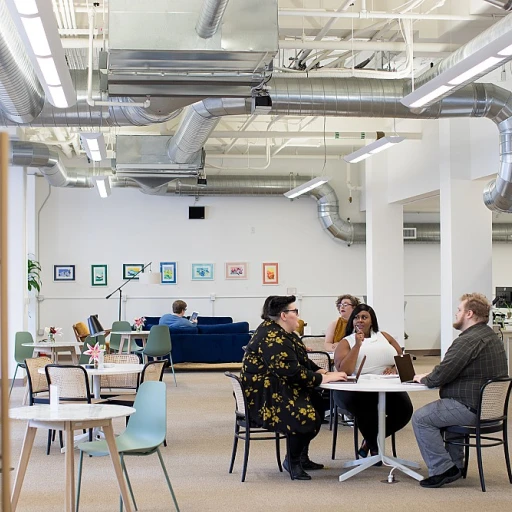
Understanding the Importance of Employee Engagement
The Significance Behind Employee Engagement
Understanding the true essence of employee engagement is a cornerstone in creating a thriving workplace culture. When employees feel valued and motivated, their productivity and job satisfaction levels increase significantly, positively impacting overall company performance. But what precisely constitutes employee engagement?
Employee engagement refers to the emotional commitment an employee has towards their organization and its goals. It's not merely about job satisfaction, but about ensuring that every team member feels like a vital part of the team and is driven to contribute positively to the company's success. This is pivotal because engaged employees often tend to work harder, innovate more frequently, and stay longer at their jobs, all resulting in reduced turnover and better business outcomes.
Boosting engagement doesn’t have to be pricey. There are numerous affordable ways that companies can adopt to create an empowered workforce. From creative recognition programs that highlight individual and team achievements, to flexible work arrangements that acknowledge personal needs, each strategy plays a crucial role in elevating the morale of your employees.
Encouraging employees to actively share in team-building activities—whether in-person or virtual—not only strengthens professional bonds but also fosters a sense of belonging. This can be achieved with inexpensive employee engagement activities that cater to diverse interests and help in cementing a participative workplace culture.
In summary, adopting thoughtful engagement strategies is not merely a nice addition to workplace initiatives but an essential component of sustainable business growth. Companies that successfully cultivate a culture that promotes engagement will ultimately cultivate engaged employees who remain committed and ready to take the business to greater heights.
Creative Recognition Programs
Fostering a Culture of Appreciation
In the realm of employee engagement, one of the simplest yet most effective methods is implementing creative recognition programs. When employees feel valued and appreciated, their job satisfaction and motivation levels tend to soar. A robust recognition strategy can transform the workplace culture into a more positive and productive environment.
- Peer Recognition: Encourage a culture where team members frequently acknowledge each other's contributions. This doesn't just need to happen from the top down. Peer recognition programs can be an inexpensive yet powerful way to boost morale and enhance employee engagement.
- Daily Shout-Outs: Allocate a few minutes each day for employees to share something positive about their colleagues. Highlighting small wins and showing appreciation can significantly improve team dynamics and individual spirits.
- Personalized Tokens of Appreciation: Consider providing customized awards or tokens that reflect specific achievements. These personal touches can make employees feel genuinely noticed and valued.
- Monthly or Quarterly Recognition Events: Host low-cost events where you formally recognize outstanding achievements within the company. These events not only honor individual accomplishments but also encourage employee engagement by fostering a sense of community.
For companies keen on enhancing their workplace culture through recognition, continuous improvement and certification programs can be instrumental. By regularly updating and refining recognition programs, businesses can ensure that they remain relevant to employees' evolving needs. Explore more about how these initiatives can aid in enhancing corporate culture through continuous improvement.
Adopting these creative recognition methods could lead to drastically increased employee engagement and a more cohesive team. While they may require some thought and planning, their positive impact on the workplace can last a long time.
Flexible Work Arrangements
Creating Flexibility To Enhance Engagement
Flexibility in the workplace has become a pivotal factor in boosting employee engagement and morale. Offering flexible work arrangements can help employees achieve a better work-life balance, ultimately leading to an engaged and motivated workforce. Flexible work schedules can take various forms. Consider these ideas to create an adaptable office environment:- Remote Work Options: Allow team members to work from home on selected days. This not only helps reduce commute stress but can also increase productivity and job satisfaction.
- Flextime Policies: Permit employees to set their own start and end times within given limits. This can empower employees to manage their day effectively, catering to personal commitments without disrupting workflow.
- Compressed Workweeks: Give employees the option to work longer hours over fewer days. For instance, condensing workdays into four days rather than five, offering extended breaks, and fostering a sense of autonomy while meeting company objectives.
Team-Building Activities on a Budget
Fostering Unity Through Budget-Friendly Collaborative Experiences
Creating a cohesive team doesn’t necessarily require an extravagant budget. In fact, some of the most effective team-building activities can be both affordable and impactful, offering employees a chance to connect and collaborate in meaningful ways. One practical approach is organizing outdoor activities that encourage employees to relax and bond outside the typical office environment. Think of having a picnic in a nearby park, or considering a group hike at a local trail. Such activities not only stimulate physical health but also offer employees the chance to engage in informal conversations, boosting morale and overall engagement. For those looking to host affordable engagement activities indoors, consider scheduling regular office gatherings where team members can showcase their individual talents or hobbies. These "show-and-tell" sessions allow employees to express their unique skills and interests, fostering a culture of appreciation and peer recognition. Leveraging technology can also be an excellent way to unite geographically dispersed teams. Hosting virtual game nights or trivia contests can create laughter and camaraderie among employees regardless of their location. Implementing inexpensive employee polling platforms can also provide insights into what type of team-building activities employees might enjoy, enabling the company to curate events that align with their interests, further engaging employees. Finally, encouraging employees to volunteer together for a local cause can build stronger workplace culture. Not only do such initiatives help the community, but they also instill a sense of pride and shared purpose among team members, leading to highly engaged employees. These budget-friendly team-building activities not only create opportunities for employees to feel valued and recognized but also reinforce the company's commitment to nurturing a positive and engaged workplace. By investing time in fostering a collaborative and inclusive environment, companies can significantly elevate job satisfaction and employee performance.Leveraging Technology for Engagement
Innovative Technologies to Keep Employees Engaged
In today's fast-paced world, leveraging technology can be a game-changer for fostering employee engagement. By integrating the right tools, companies can create an environment where employees feel valued and motivated.- Virtual Platforms for Team Collaboration: Platforms like Slack or Microsoft Teams can facilitate seamless communication among team members, whether they are working in the office or remotely. These tools offer features that encourage employees to share ideas, provide feedback, and engage in peer recognition. The ease of communication helps boost morale by making everyone feel connected, even in a virtual setting.
- Engagement Tracking Software: Implementing software to monitor employee engagement can provide valuable insights into what aspects of workplace culture work well and what areas need improvement. These tools help track participation in activities, recognition programs, and peer feedback, which are fundamental to creating an engaged workforce.
- Interactive Learning Modules: Online courses and webinars can provide opportunities for professional development, which is crucial for job satisfaction. Employees feel more engaged when they see that their company invests in their growth. These learning modules can be accessed anytime, allowing employees to learn at their own pace.
- Employee Feedback Tools: Tools dedicated to collecting employee feedback, such as surveys and polls, can encourage employees to voice their opinions. When employees feel heard, they are more likely to be satisfied with their work environment. This continuous loop of feedback and improvement can also serve as a powerful engagement idea that nurtures a positive company culture.
Encouraging Employee Feedback
Harnessing the Power of Feedback
Engaging employees requires a multifaceted approach, and one effective way to foster a thriving workplace culture is through consistent and constructive feedback. Encouraging employees to share their thoughts not only creates a sense of inclusion but also aids in boosting job satisfaction. Feedback mechanisms, when utilized effectively, can transform how employees feel valued within their teams. To integrate feedback seamlessly into the work environment, consider the following ideas:- Peer Recognition Platforms: Implement an online platform where employees can recognize their peers in real-time. This can be part of a creative recognition program that complements traditional methods.
- Anonymous Surveys: Regularly inviting employees to provide anonymous feedback on various aspects of their work can help management identify areas for improvement while keeping employees engaged.
- One-on-One Meetings: Regular check-ins with team members not only encourage open communication but can also provide valuable insights into employee experience and morale.
- Feedback Training Workshops: Inexpensive employee engagement activities such as workshops can equip teams with the skills to give and receive feedback effectively, enhancing team dynamics.













